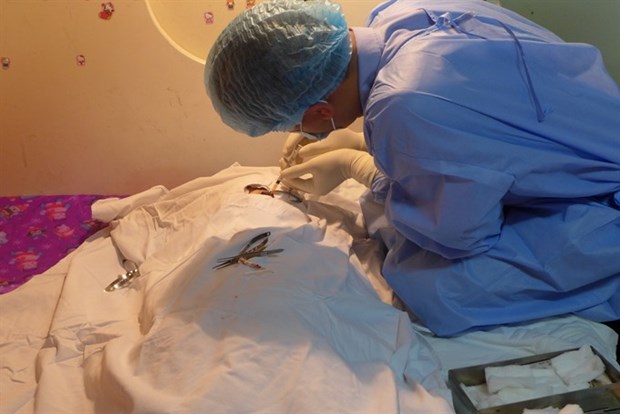 Doctor Hoang conducts the surgery to take An’s cornea.—Photo courtesy of the Vietnam National Co-ordinating Centre for Human Organ Transplantation. (Source: VNA)
Doctor Hoang conducts the surgery to take An’s cornea.—Photo courtesy of the Vietnam National Co-ordinating Centre for Human Organ Transplantation. (Source: VNA)Hanoi (VNS/VNA)
– , 7, from Hanoi’s Nam Tu Liem district, took her last breath on
February 22. But before she passed away in her K Hospital sickbed, she and her
mother agreed that she would give her cornea to people who could use it.
An became the in the country so far.
The little girl, who had fought astrocytomas since September 2017, nodded without
hesitation after her mother said she wanted to continue to see An’s eyes in the
coming years by giving An’s cornea to others.
Astrocytomas are tumours that arise from astrocytes—star-shaped cells that make
up the “glue-like” or supportive tissue of the brain.
The tumours are “graded” on a scale from I to IV based on how normal or
abnormal the cells look. There are low-grade astrocytomas and high-grade
astrocytomas. Low-grade astrocytomas are usually localised and grow slowly.
High-grade astrocytomas grow at a rapid pace and require a different course of
treatment. Most astrocytoma tumors in children are low grade.
Pham Thi Viet Huong, deputy head of the hospital’s Pediatrics Department, who
directly treated An, said that when An was hospitalised last year, she was
already in bad condition.
An had severe headaches, paralysis on one side of her body and had to breathe
via an oxygen tube, Huong said.
“An is really a very good child,” she added.
“She always obeys every request of the doctors for her treatment, although she
had overwhelming pains due to the tumour, which a little girl could not bear.”
An was one of the most special patients Huong had met. “I could not forget the
little girl with a sunny smile and bright eyes,” she added.
“An’s tumour was so large that we could not use radiotherapy – the only
strategy that might have rescued her at that time,” the doctor said.
Nguyen Huu Hoang, Director of the Vietnam National Coordinating Centre for
Human Organ Transplantation, recalled the moment he came to An’s house to take
her cornea as An and her parents expected.
“The first moment I entered the house, An was cradled in her mother’s arms like
she was sleeping tight,” he said.
Hoang and his two colleagues tried to conduct the 30-minute surgery as gently
as they could. An’s cornea later was preserved in the Bank of Eyes under the Hanoi
-based National Hospital of Ophthalmology before being transplanted for people
in need.
This was the second surgery Hoang and his colleagues had undertaken to take a
cornea from a child. “But the surgery still ended with the doctors in
tears,” he said.
They felt deeply touched because An’s parents overcame the normal prejudice
that people’s bodies should be complete when they die in order to donate An’s
cornea, Hoang said.
Not only the doctors but also thousands of other people had the same feeling of
respect and gratitude when they heard An’s story, including Minister of Health
Nguyen Thi Kim Tien. She sent a condolence wreath to An.
Nguyen Hoang Phuc, Deputy Director of the Vietnam National Coordinating Centre
for Human Organ Transplantation, said, “Everyone can live the second life after
he or she dies if he or she donates a part of their body to people who need
it.”
On February 26, An’s cornea were transplanted to two people, including a
73-year-old person and a 42-year-old person after the consultation of the
hospital’s doctors. The 73-year-old person has cornea scarring and the
42-year-old was born with a cataract.
An’s cornea was very precious: a survey by the hospital showed up to 300,000
people need a cornea transplant, but only 100-150 people receive a each
year due to a national shortage.
Nguyen Tran Thuy Duong, An’s mother, said first that she wanted to donate her
daughter’s organ. Nevertheless, the current law did not allow it. The Law on
Organ Donation only permits people above 18 years old to donate organs. So An
alone couldn’t make the decision to donate her cornea.
“I want to do that because I know many sick children who are in need of organ
transplantation,” Duong said.
Therefore, Phuc, Deputy Director of the centre, said the centre would submit to
the health ministry and the Government to amend the law in the coming time.
The should be adjusted, he said.
“If we do that, we will save more people,” he said.-VNS/VNA
Source: VietnamPlus
